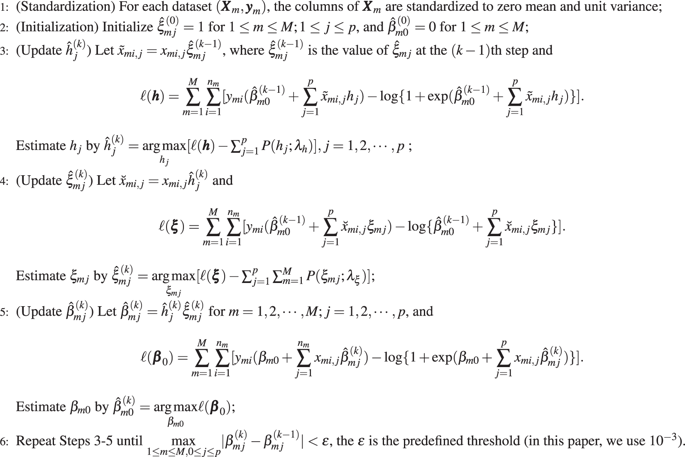Scientific Reports ( IF 3.8 ) Pub Date : 2020-04-01 , DOI: 10.1038/s41598-020-62473-2 Hui Zhang 1 , Shou-Jiang Li 1 , Hai Zhang 1, 2 , Zi-Yi Yang 1 , Yan-Qiong Ren 1 , Liang-Yong Xia 1 , Yong Liang 1

|
The widespread applications of high-throughput sequencing technology have produced a large number of publicly available gene expression datasets. However, due to the gene expression datasets have the characteristics of small sample size, high dimensionality and high noise, the application of biostatistics and machine learning methods to analyze gene expression data is a challenging task, such as the low reproducibility of important biomarkers in different studies. Meta-analysis is an effective approach to deal with these problems, but the current methods have some limitations. In this paper, we propose the meta-analysis based on three nonconvex regularization methods, which are L1/2 regularization (meta-Half), Minimax Concave Penalty regularization (meta-MCP) and Smoothly Clipped Absolute Deviation regularization (meta-SCAD). The three nonconvex regularization methods are effective approaches for variable selection developed in recent years. Through the hierarchical decomposition of coefficients, our methods not only maintain the flexibility of variable selection and improve the efficiency of selecting important biomarkers, but also summarize and synthesize scientific evidence from multiple studies to consider the relationship between different datasets. We give the efficient algorithms and the theoretical property for our methods. Furthermore, we apply our methods to the simulation data and three publicly available lung cancer gene expression datasets, and compare the performance with state-of-the-art methods. Our methods have good performance in simulation studies, and the analysis results on the three publicly available lung cancer gene expression datasets are clinically meaningful. Our methods can also be extended to other areas where datasets are heterogeneous.
中文翻译:

基于非凸正则化的荟萃分析。
高通量测序技术的广泛应用产生了大量公开可用的基因表达数据集。然而,由于基因表达数据集具有小样本、高维度和高噪声的特点,应用生物统计学和机器学习方法来分析基因表达数据是一项具有挑战性的任务,例如不同物种中重要生物标志物的重复性较低。研究。 Meta分析是处理这些问题的有效方法,但目前的方法存在一定的局限性。在本文中,我们提出了基于三种非凸正则化方法的荟萃分析,即L 1/2正则化(meta-Half)、最小最大凹罚正则化(meta-MCP)和平滑剪切绝对偏差正则化(meta-SCAD) 。三种非凸正则化方法是近年来发展起来的有效的变量选择方法。通过系数的层次分解,我们的方法不仅保持了变量选择的灵活性,提高了选择重要生物标志物的效率,而且还总结和综合了多项研究的科学证据,以考虑不同数据集之间的关系。我们给出了我们的方法的有效算法和理论特性。此外,我们将我们的方法应用于模拟数据和三个公开可用的肺癌基因表达数据集,并将其性能与最先进的方法进行比较。我们的方法在模拟研究中具有良好的性能,并且对三个公开的肺癌基因表达数据集的分析结果具有临床意义。 我们的方法还可以扩展到数据集异构的其他领域。











































 京公网安备 11010802027423号
京公网安备 11010802027423号